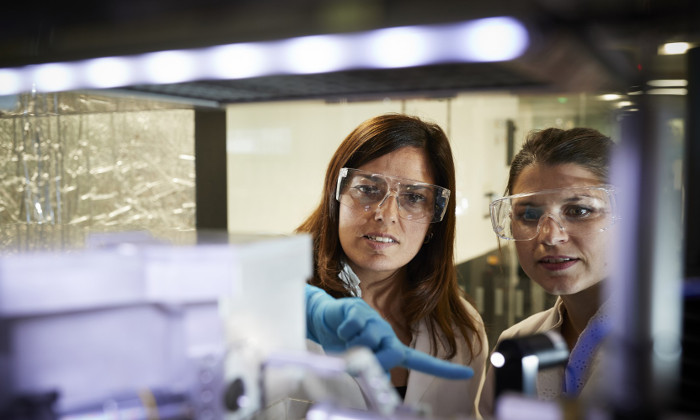Pioneering 20th Century Scientist Inspires New Fellowship Scheme
12 Nov 2018
Two exceptional scientists have been awarded prestigious BP funded fellowships to carry out research at The University of Manchester with a range of advanced materials applications, from carbon capture and storage, to smart materials and sensors.

The fellowships aim to launch and support the careers of exceptional early stage scientists who would benefit from flexible development opportunities.
The newly launched scheme, known as the BP-ICAM Kathleen Lonsdale Research Fellowships, has been created and funded by BP through the $100m BP International Centre for Advanced Materials (BP-ICAM). The scheme takes its name from Dame Kathleen Lonsdale FRS, a pioneering 20th century scientist who used X-ray imaging techniques to discover that benzene rings are flat and subsequently became one of the first two women to be elected as a Fellow of the Royal Society in 1945.
The two recipients, Dr Lisa Joss and Dr Ahu Gümrah Dumanli-Parry, will join the University at the start of 2019 to begin working on their ambitious research projects. The Fellowships provide five years of funding salaries and research expenses, as well as additional flexible funds to support a healthy work-life balance and career development opportunities. The Fellowships offer the possibility of a highly flexible working pattern, including part-time working, converting from full-time to part-time and back, sabbaticals and secondments.
Dr Angelo Amorelli, Technology Vice-President of Group Research at BP, said: “At BP we are committed to supporting talented scientists and engineers who have a passion for translating their research into industrial applications which can make a difference and add real value. The two BP-ICAM Kathleen Lonsdale Fellows are outstanding examples of how BP is working with its strategic partners to attract diverse candidates and strengthen the careers of researchers in academia who can help us to solve our business challenges.”
Dr Joss, a talented chemical engineer currently working as a Research Associate at Imperial College London, will be investigating new material characterisation methods across a range of length scales to bridge the gap between materials research and process design. Dr Joss said: “I am delighted to be one of the first recipients of a BP-ICAM Kathleen Lonsdale Fellowship. My research will focus on the characterisation and simultaneous design of optimal materials and processes for a wide range of low-carbon applications, from gas separations to carbon capture and storage.”
David Lonsdale, barrister and grandson of Dame Kathleen Lonsdale, said: “I am very proud that my grandmother’s legacy is being honoured with the launch of the BP-ICAM Kathleen Lonsdale Research Fellowships. Kathleen came from humble beginnings and was raised in a poor Irish family but she was fortunate enough to receive a scholarship at the age of 16 to allow her to study science at university in London. Without this scholarship my family would not be in the position it is today, so I can testify how life changing these opportunities can be.”
David Lonsdale, added: “Kathleen also spent the early part of the 1930s caring for her young family before going on to have a distinguished career, so she would have been very passionate about this scheme, which is providing a wonderful opportunity for two exceptional scientists with flexible requirements today.”
Professor Martin Schröder, Vice-President of The University of Manchester and Dean of the Faculty of Science and Engineering, said: “We are delighted that the first two recipients of these prestigious fellowships will be at the University of Manchester, reflecting the strategic importance of our collaboration with BP across advanced materials research via the BP-ICAM. I congratulate Dr Joss and Dr Dumanli-Parry most warmly. They have outstanding track records and their interdisciplinary research projects will be of benefit to both BP and the wider society.”
